Here’s a breakdown of the composition of the most commonly cited food dyes, including their sources and how they are made:
1. Red 40 (Allura Red AC)
- Composition: Synthetic dye made from petroleum products.
- Source: Derived from the azo dye family. It is created through a chemical process involving the reaction of aromatic amines.
2. Yellow 5 (Tartrazine)
- Composition: Synthetic dye made from petroleum.
- Source: Produced by the sulfonation of 4-pyrenesulfonic acid. It can also be derived from coal tar.
3. Yellow 6 (Sunset Yellow)
- Composition: Synthetic dye also made from petroleum.
- Source: Created from the reaction of anthranilic acid with other chemicals, leading to a yellow azo dye.
4. Blue 1 (Brilliant Blue FCF)
- Composition: Synthetic dye derived from petroleum.
- Source: Created through a series of chemical reactions involving p-phenylenediamine and is a part of the triphenylmethane dye family.
5. Red 3 (Erythrosine)
- Composition: Synthetic dye derived from the xanthene family.
- Source: Made from the reaction of phthalic anhydride and resorcinol, followed by a series of chemical modifications.
6. Carmine (Cochineal)
- Composition: Natural dye made from carminic acid.
- Source: Extracted from cochineal insects (Dactylopius coccus), which are harvested, dried, and processed to obtain the red pigment.
7. Allura Red (Red 40) and Tartrazine (Yellow 5) Combination
- Composition: Allura Red is an azo dye, while Tartrazine is derived from petroleum.
- Source: Both are synthetic and produced through chemical processes involving aromatic compounds and amines
Most artificial food dyes are synthetic and derived from petroleum products, which raises concerns about their safety and potential health risks. In contrast, carmine is a natural dye but still poses allergenic risks for some individuals. When considering food dyes, it’s essential to be informed about their sources and potential impacts on health.
My blogs contain some affiliate links.
Any purchase made is a blessing to my family at no extra cost to you!
Thank you for supporting us!

As moms, we work tirelessly to protect the health and well-being of our children. So, it’s infuriating to see companies continually use harmful food dyes in candies and snacks marketed directly to our kids. These artificial dyes, linked to issues like hyperactivity, allergies, and even cancer in some studies, have no place in our children’s treats. Yet, they remain widespread, prioritizing bright colors and flashy marketing over the safety of our families. This blatant disregard for health is unacceptable, and it’s time for us to demand better from the companies profiting off our trust.
Candy often contains a variety of food dyes to enhance its visual appeal. Here are some of the most common food dyes found in candies:
1. Red 40 (Allura Red AC)
- Uses: Widely used in gummies, fruit-flavored candies, and chocolate-covered treats.
- Concerns: Linked to hyperactivity and allergic reactions in some individuals.
2. Yellow 5 (Tartrazine)
- Uses: Commonly found in sour candies, lemon-flavored treats, and yellow-colored confections.
- Concerns: Associated with allergic reactions and hyperactivity.
3. Yellow 6 (Sunset Yellow)
- Uses: Used in candies, particularly those that are orange or yellow, such as jelly beans and candy corn.
- Concerns: Linked to allergies and hyperactivity; may have carcinogenic potential in animal studies.
4. Blue 1 (Brilliant Blue FCF)
- Uses: Found in blue raspberry candies, lollipops, and some chocolate bars.
- Concerns: Although generally considered safe, some studies suggest potential links to hyperactivity.
5. Blue 2 (Indigotine)
- Uses: Common in blue-colored candies and drinks.
- Concerns: Safety concerns arise regarding its effects on hyperactivity, though more research is needed.
6. Green 3 (Fast Green)
- Uses: Sometimes used in green-colored candies or fruit-flavored confections.
- Concerns: Limited data on its safety; potential links to hyperactivity.
7. Red 3 (Erythrosine)
- Uses: Previously common in many candies, now less frequently used due to safety concerns.
- Concerns: Found to be carcinogenic in animal studies; its use has been restricted in some products.
Examples of Candies Containing These Dyes
- Gummy Bears: Often contain Red 40 and Yellow 5 for vibrant colors.
- Skittles: Use a combination of Red 40, Yellow 5, and Blue 1.
- M&M's: Often contain various dyes, including Yellow 5 and Red 40.
- Sour Patch Kids: Typically contain Red 40 and Yellow 5.
Candy manufacturers often rely on these synthetic dyes to create visually appealing products. However, health-conscious consumers should be aware of the potential risks associated with these additives, particularly for children who may be more sensitive to their effects. Reading ingredient labels can help identify and avoid certain dyes in candy.
We’ve had enough. Companies need to stop prioritizing profit over the health of the people they serve, especially our children. There’s no excuse for continuing to use harmful synthetic dyes when natural, safer alternatives are available. Moms everywhere are calling for transparency and action—remove these dangerous ingredients and offer healthier options. As consumers, we have power. Let’s use it to demand change, protect our families, and hold these companies accountable for what they put in our food. Together, we can create a world where the treats our children enjoy are as safe as they are sweet.
My blogs contain some affiliate links.
Any purchase made is a blessing to my family at no extra cost to you!
Thank you for supporting us!

Boost Your Smoothie Game with Chia Seeds: A Nutritional Powerhouse
Smoothies are a delicious and convenient way to pack multiple nutrients into a single glass, making them a popular choice for health enthusiasts everywhere. One simple yet powerful ingredient that can elevate the nutritional value of your smoothie is the tiny but mighty chia seed. Known for their high fiber content, rich omega-3 fatty acids, potent antioxidants, and impressive calcium levels, chia seeds can transform your smoothie into a health-boosting powerhouse.
The Nutritional Benefits of Chia Seeds
- High in Fiber: Chia seeds are a fantastic source of dietary fiber, which is essential for maintaining healthy digestion. Just one ounce of chia seeds contains nearly 11 grams of fiber. Adding them to your smoothie can help you feel fuller for longer, support digestive health, and help regulate blood sugar levels.
- Rich in Omega-3 Fatty Acids: Omega-3s are essential fats that play a crucial role in heart health. Chia seeds are one of the top plant-based sources of omega-3 fatty acids, which help reduce inflammation and improve heart function. Incorporating chia seeds into your diet can support cardiovascular health and provide a plant-based alternative to fish oil.
- Packed with Antioxidants: Chia seeds are loaded with antioxidants, which protect the body from free radical damage. Antioxidants are vital for reducing oxidative stress and promoting overall health. By adding chia seeds to your smoothie, you're giving your body a boost in its fight against cellular damage.
- High in Calcium: Chia seeds boast a significant calcium content, which supports bone health and overall wellness. One ounce of chia seeds provides about 18% of the recommended daily intake of calcium. Including chia seeds in your smoothies can help maintain strong bones and teeth, making it an excellent addition for those following a plant-based diet.
How to Incorporate Chia Seeds into Your Smoothies
Adding chia seeds to your smoothies is incredibly simple and versatile. Here are a few tips to get you started:
- Pre-Soak for Texture: To create a smoother texture, soak chia seeds in water or your preferred plant-based milk for a few minutes before adding them to your smoothie. This allows the seeds to expand and soften, enhancing the overall consistency.
- Blend Them In: For a quick and easy addition, simply toss a tablespoon of chia seeds directly into your blender along with your other smoothie ingredients. They will blend seamlessly, adding a subtle nutty flavor.
- Try Different Combinations: Chia seeds work well in a variety of smoothie recipes. Pair them with tropical fruits for a refreshing drink, or add them to green smoothies for an extra nutritional punch. Experiment with different flavors to find your perfect match.
Give Your Smoothie a Nutritional Boost
Chia seeds are an effortless way to enhance the nutritional profile of your smoothies, providing fiber, omega-3s, antioxidants, and calcium with minimal effort. Their versatility and health benefits make them a must-have ingredient in any smoothie enthusiast's kitchen. So why not take your next smoothie to the next level? Add a scoop of chia seeds and enjoy a delicious, health-boosting treat. Your body will thank you for it!
Here are some recipes to try!
Tropical Chia Smoothie
Ingredients:
- 1 cup coconut milk
- 1 tablespoon chia seeds
- 1 banana
- 1/2 cup frozen mango
- 1/2 cup frozen pineapple
- 1 teaspoon honey or maple syrup (optional)
- Ice cubes (optional)
Instructions:
- In a blender, combine coconut milk and chia seeds. Let them sit for 5 minutes to allow the seeds to expand.
- Add banana, frozen mango, frozen pineapple, and sweetener if using.
- Blend until smooth. Add ice cubes for a thicker consistency if desired.
- Pour into a glass and enjoy a taste of the tropics!
Berry Bliss Chia Smoothie
Ingredients:
- 1 cup almond milk
- 1 tablespoon chia seeds
- 1/2 cup frozen strawberries
- 1/2 cup frozen blueberries
- 1/4 cup frozen raspberries
- 1 tablespoon almond butter
- 1 teaspoon vanilla extract
Instructions:
- Combine almond milk and chia seeds in a blender and let them sit for 5 minutes.
- Add strawberries, blueberries, raspberries, almond butter, and vanilla extract.
- Blend until smooth and creamy.
- Serve immediately and enjoy the berry goodness!
Green Power Chia Smoothie
Ingredients:
- 1 cup oat milk
- 1 tablespoon chia seeds
- 1 handful of spinach
- 1/2 avocado
- 1 green apple, cored and chopped
- 1 tablespoon lemon juice
- 1 teaspoon agave syrup (optional)
Instructions:
- In a blender, mix oat milk with chia seeds and let them sit for 5 minutes.
- Add spinach, avocado, apple, lemon juice, and agave syrup if using.
- Blend until smooth and vibrant green.
- Pour into a glass and power up your day with this nutritious smoothie!
Chocolate Mint Chia Smoothie
Ingredients:
- 1 cup almond milk
- 1 tablespoon chia seeds
- 1 banana
- 2 tablespoons cocoa powder
- 1/4 teaspoon peppermint extract
- 1 tablespoon maple syrup
- Fresh mint leaves for garnish (optional)
Instructions:
- Combine almond milk and chia seeds in a blender, allowing them to sit for 5 minutes.
- Add banana, cocoa powder, peppermint extract, and maple syrup.
- Blend until smooth and chocolatey.
- Garnish with fresh mint leaves if desired and indulge in this refreshing treat!
Pumpkin Spice Bliss Smoothie
Ingredients:
- 1 cup almond milk
- 1/2 cup canned pumpkin
- 1 banana
- 1 teaspoon pumpkin spice
- 1 tablespoon chia seeds
- 1 tablespoon pure maple syrup
Instructions:
- In a blender, combine almond milk and chia seeds. Allow them to sit for 5 minutes to let the seeds expand.
- Add canned pumpkin, banana, pumpkin spice, and pure maple syrup.
- Blend until smooth and creamy.
- Pour into a glass, savor the autumn flavors, and enjoy this nourishing treat!
Enjoy blending up some tasty, healthy treats! 🥤
My blogs contain some affiliate links.
Any purchase made is a blessing to my family at no extra cost to you!
Thank you for supporting us!

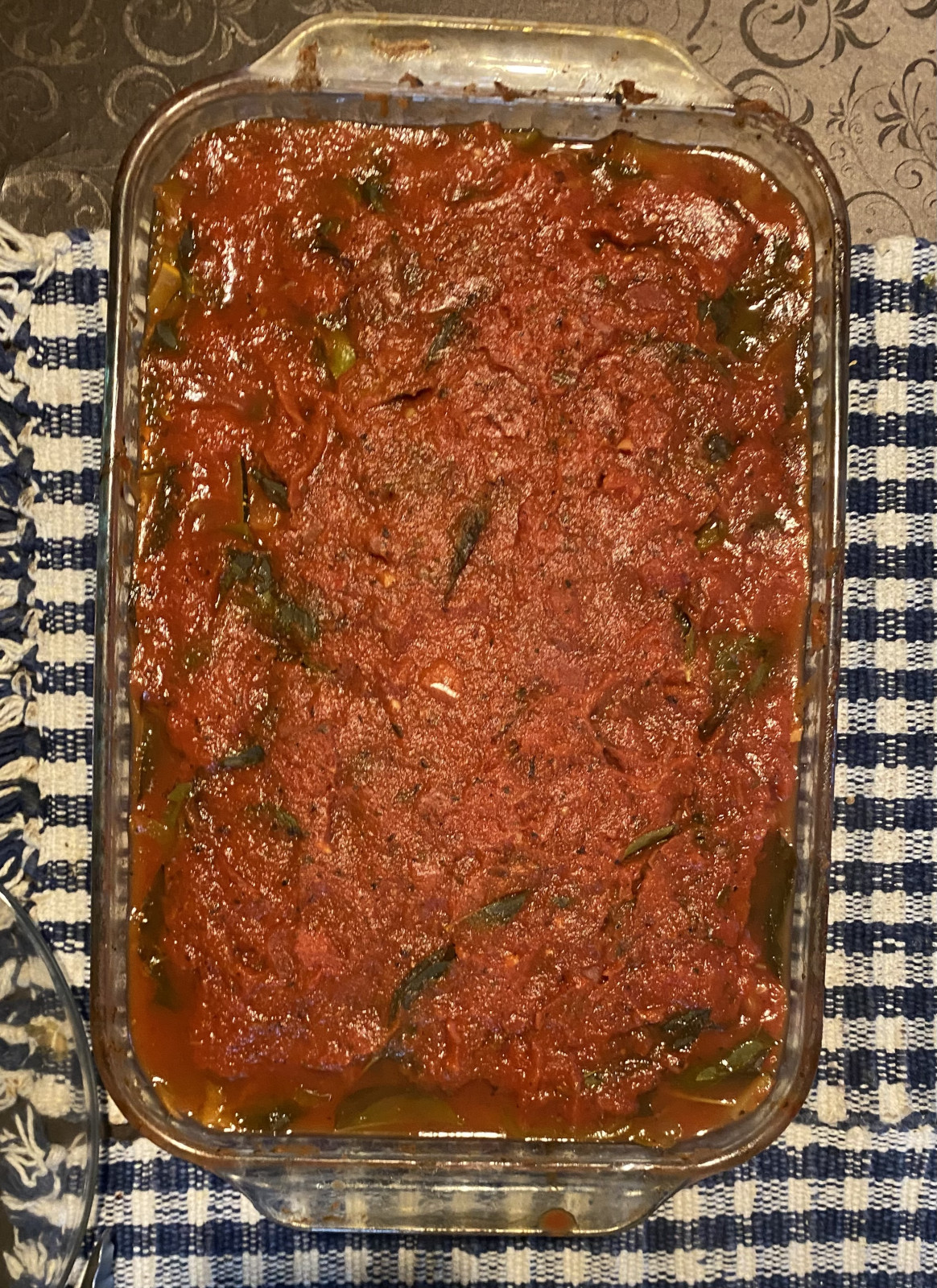
This baked ratatouille recipe is a simple, colorful, and flavorful dish that highlights the natural sweetness of fresh vegetables. Perfect for a healthy dinner or side dish, it’s a beautiful way to showcase seasonal produce. I love this dish, but am allergic to eggplant, so I leave that ingredient out. If you like yours with eggplant, by all means, add that in, too.
Ingredients:
- 2 cups diced tomatoes (fresh or canned)
- 2 small/medium zucchini, thinly sliced
- 2 small/medium yellow squash, thinly sliced
- 2 large bell peppers (any color), thinly sliced
- 1 large white onion, thinly sliced
- 2 cups fresh basil leaves
- 4 cups spaghetti sauce (store-bought or homemade)
Instructions:
1. Preheat the Oven: Preheat your oven to 350°F (175°C).
2. Prepare the Vegetables: Thinly slice the zucchini, yellow squash, bell peppers, and onion. I use this to get mine super thin. If using fresh tomatoes, dice them; if using canned, drain any excess liquid.
3. Layer the Ingredients: In a large baking dish, start by spreading a layer of spaghetti sauce on the bottom. Then, begin layering the vegetables. Add a layer of sliced zucchini, yellow squash, bell peppers, and onions. Sprinkle with some diced tomatoes and fresh basil leaves. Continue layering the vegetables, repeating at least twice, until all ingredients are used up. End with a final layer of spaghetti sauce on top.
4. Cover and Bake: Cover the baking dish tightly with foil. Bake in the preheated oven for 1 hour, or until the vegetables are tender and cooked through.
5. Serve: After baking, remove the foil and let the ratatouille rest for a few minutes before serving. Garnish with extra fresh basil if desired.
This baked ratatouille can be served on its own, over spaghetti, or alongside crusty bread for a complete meal! Yum!
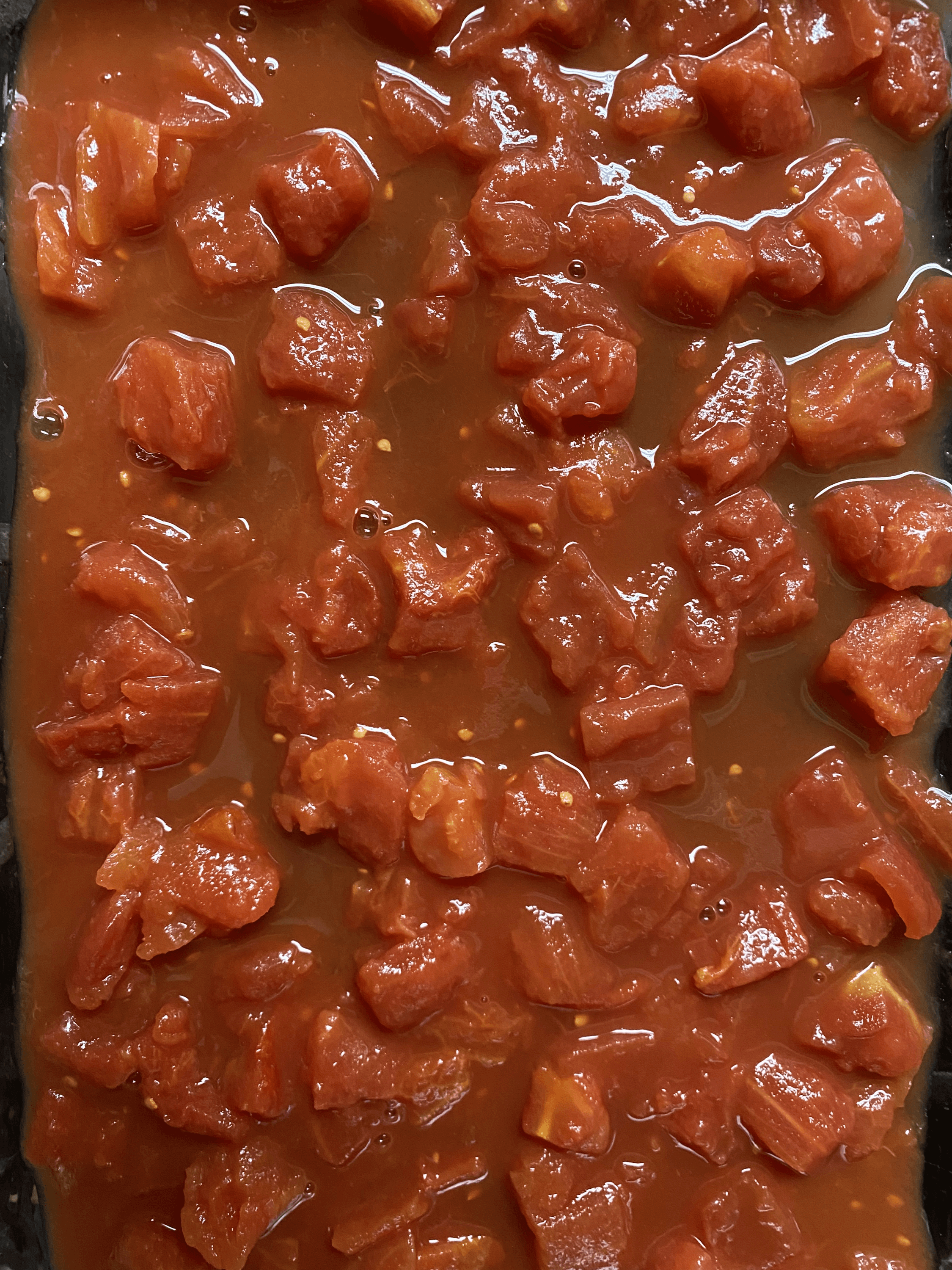
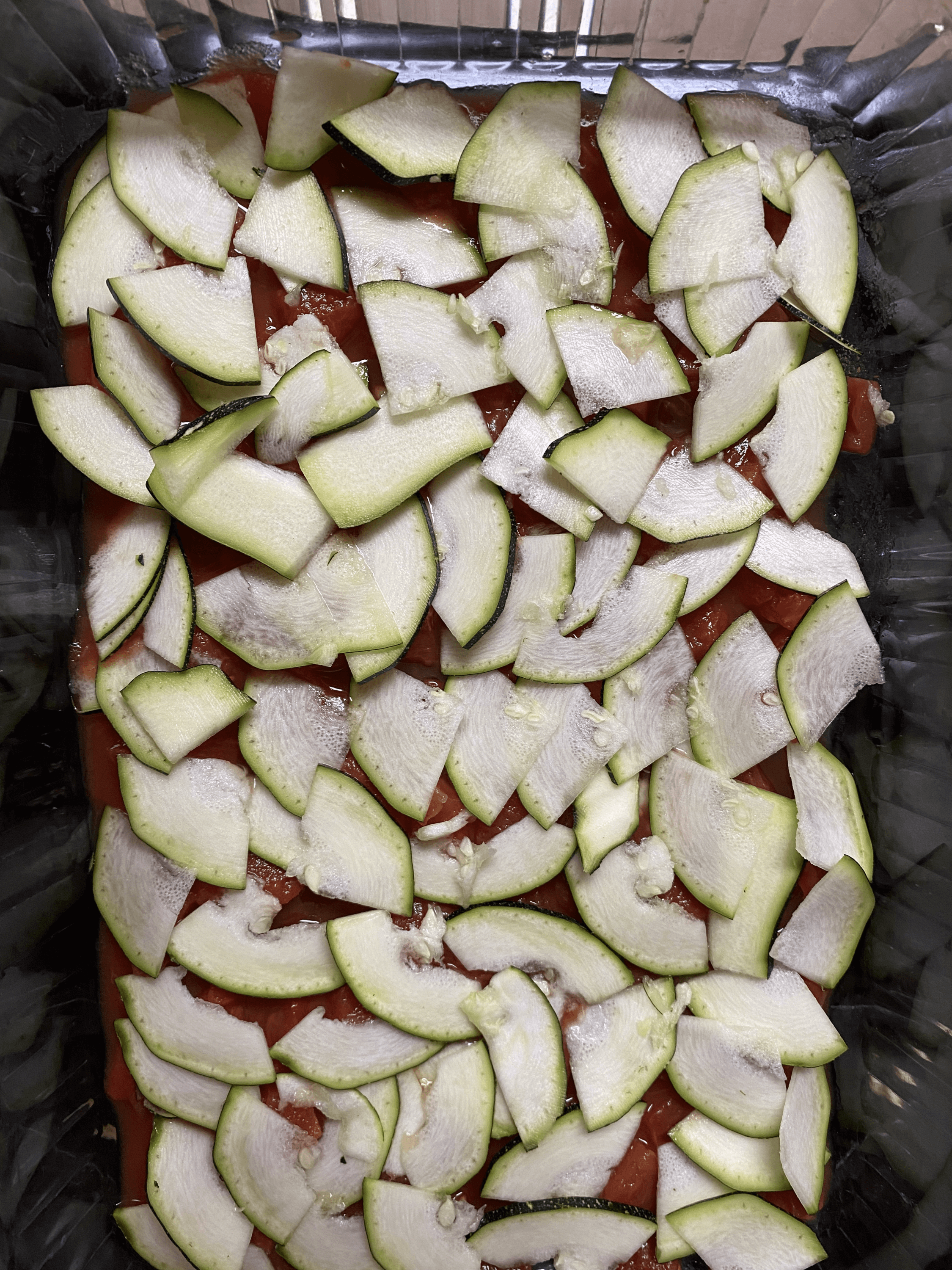
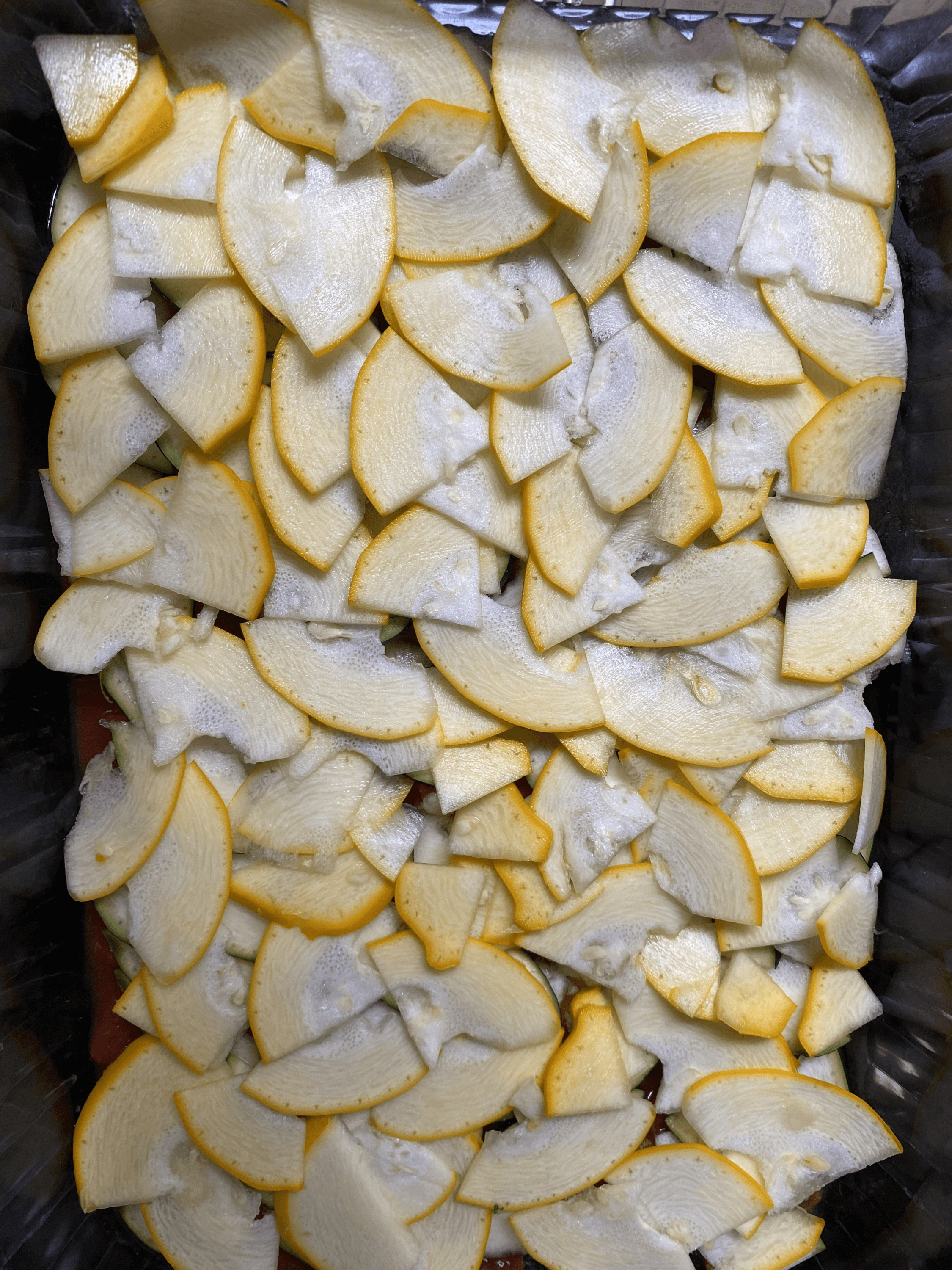

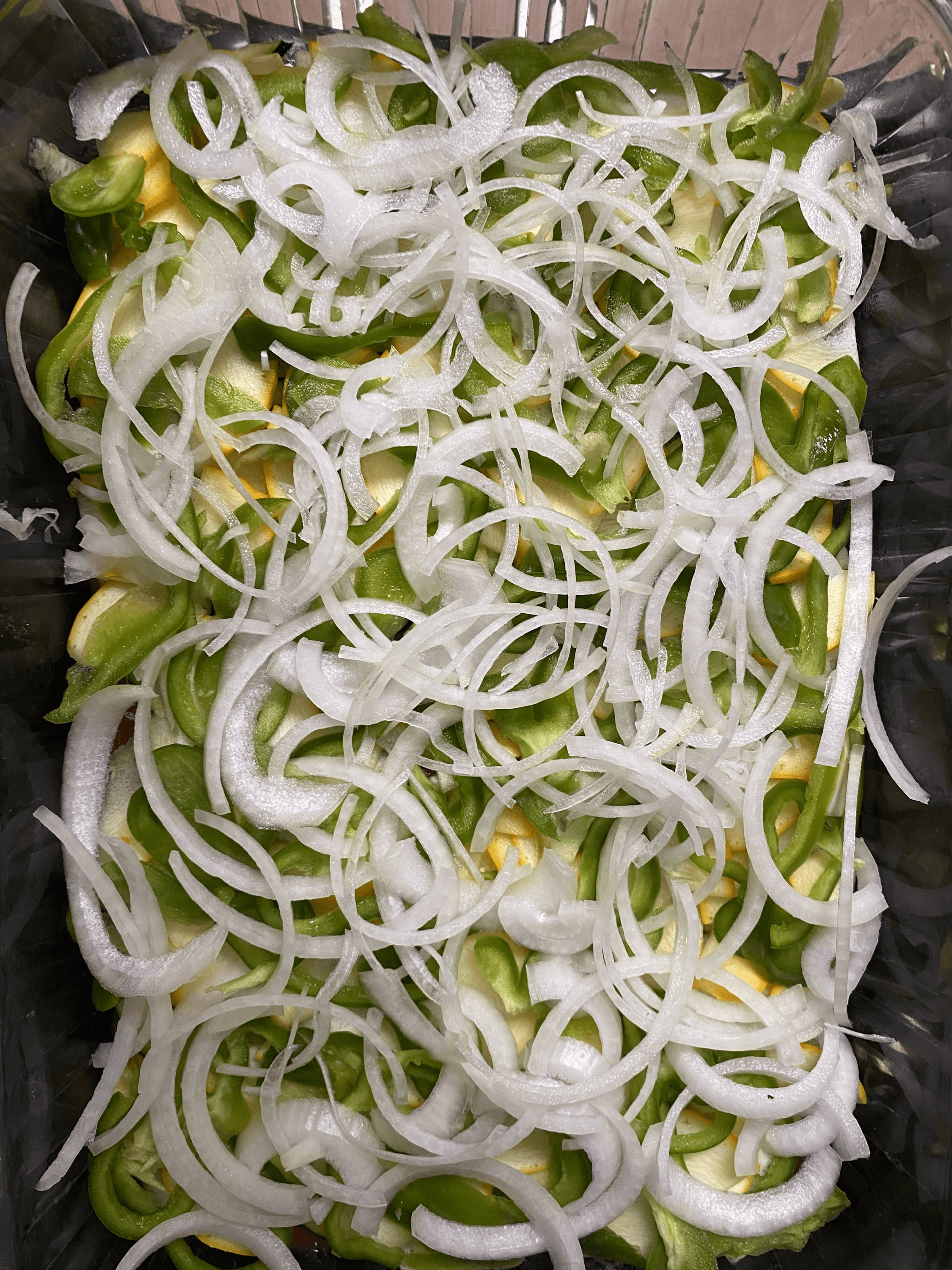
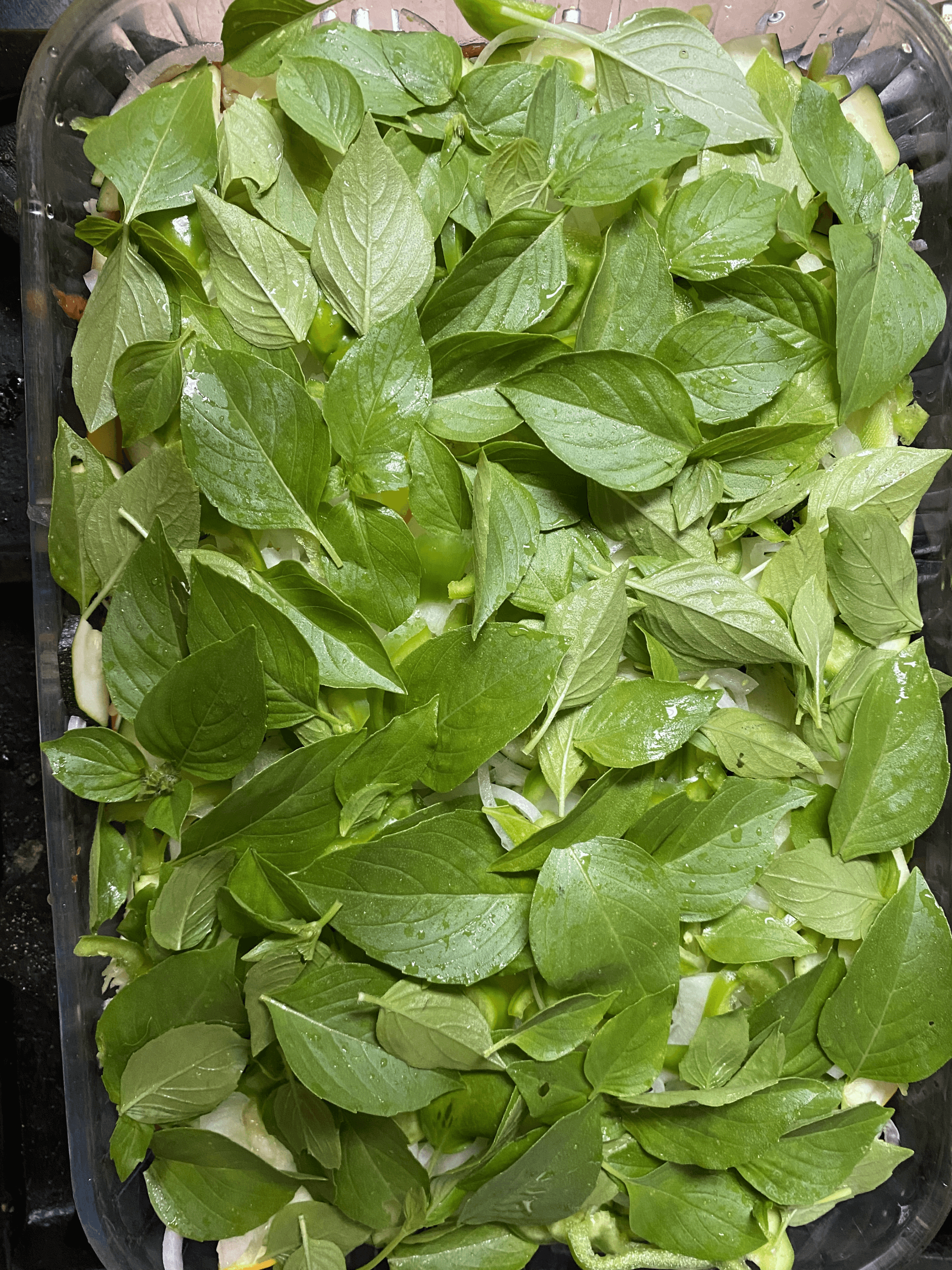
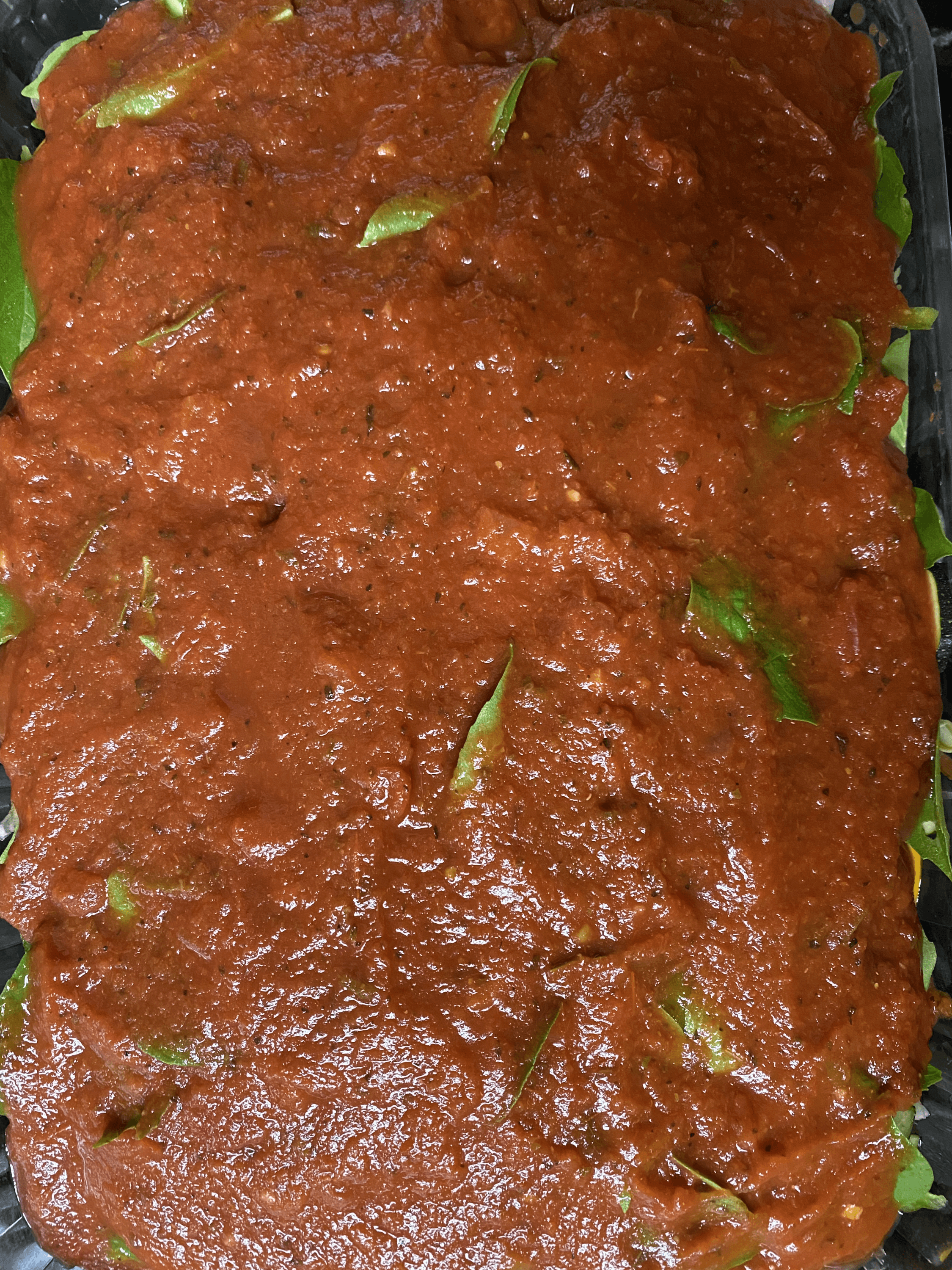
My blogs contain some affiliate links.
Any purchase made is a blessing to my family at no extra cost to you!
Thank you for supporting us!

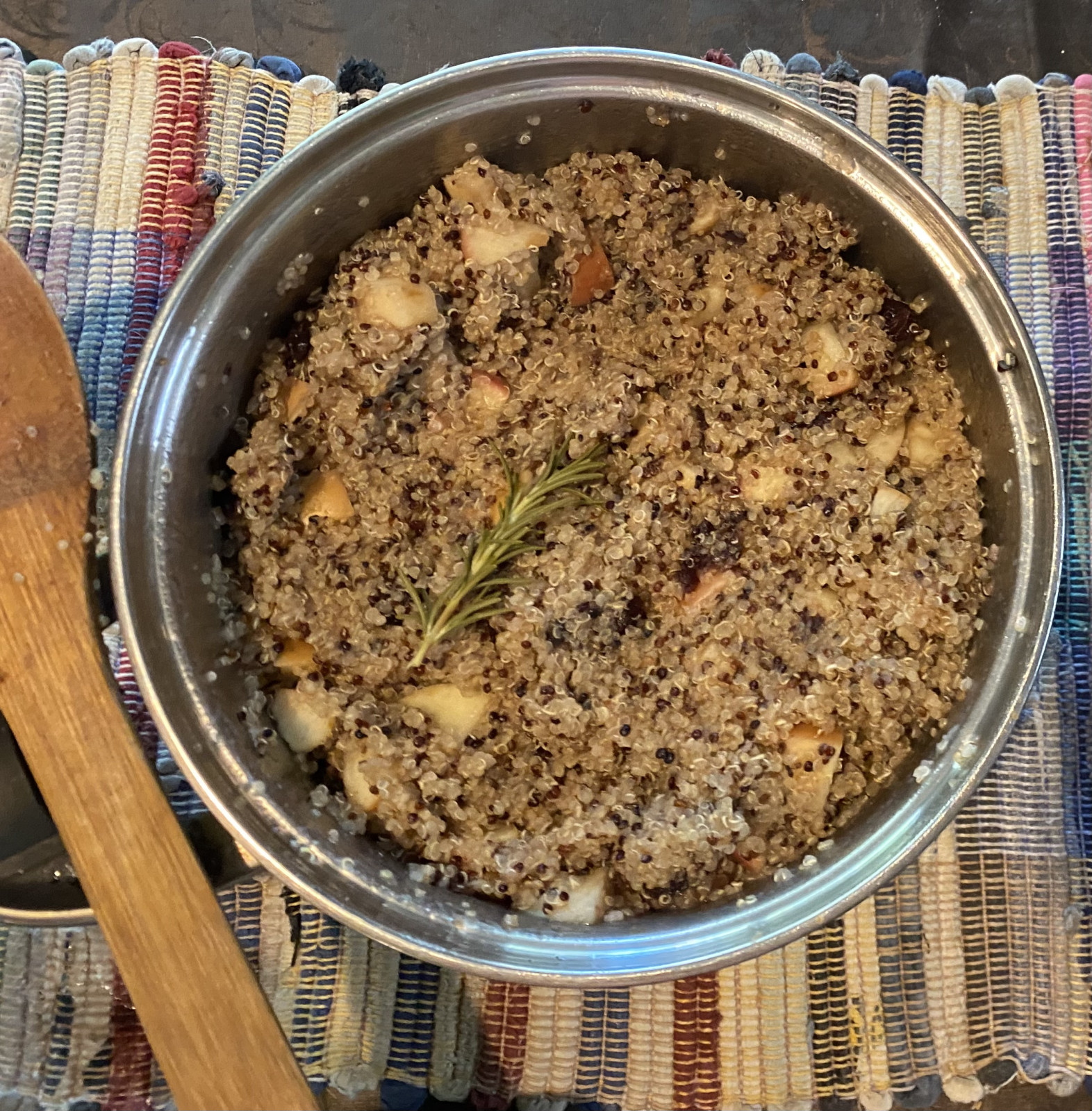
This delicious quinoa salad is a perfect blend of sweet and nutty flavors, making it a great side dish or light meal. Packed with protein-rich quinoa, tart cranberries, crisp apples, warm cinnamon, and crunchy pecans, it’s a healthy and satisfying dish for any time of year.
This was a family favorite the very first time! I was actually inspired by a quinoa salad I ate in an airport recently, so I came home and created this!
Ingredients:
- 1 cup quinoa, rinsed
- 1 1/2 cup water
- 16 oz can of cranberry sauce (with whole cranberries)
- 1 apple, diced (Granny Smith works well)
- 1/2 cup pecans, chopped and lightly toasted
- 1/2 teaspoon ground cinnamon
- 1 tablespoon maple syrup or honey (optional)
- 1 sprig rosemary (optional)
Optional dressing
- 1 tablespoon olive oil
- 1 tablespoon lemon juice or apple cider vinegar
- Salt and pepper to taste
Instructions:
1. Cook the Quinoa: In a medium saucepan, bring water and cranberry sauce to a boil. Add the quinoa & rosemary (opt.), reduce heat to low, cover, and simmer for about 15 minutes or until all the liquid is absorbed. Fluff with a fork..
2. Combine the Ingredients: Add in apples, cinnamon, and maple syrup. Let mixture cool with the lid on.
3. Toast the Pecans: While the quinoa is cooking, toast the pecans. Place the chopped pecans in a dry skillet over medium heat and cook for about 3-5 minutes, stirring frequently, until they’re fragrant and slightly browned. Set aside.
4. *Optional - Mix the Dressing: In a small bowl, whisk together the olive oil, lemon juice (or apple cider vinegar). Add salt and pepper to taste.
5. Season and Serve: Taste the salad and adjust seasoning with more salt, pepper, or cinnamon if needed. Sprinkle with pecans. Serve warm or chilled, depending on your preference.
Optional Add-ins:
- **Fresh spinach** or **arugula** to add greens
- A sprinkle of **chia seeds** or **hemp seeds** for extra nutrition
Enjoy!
My blogs contain some affiliate links.
Any purchase made is a blessing to my family at no extra cost to you!
Thank you for supporting us!



